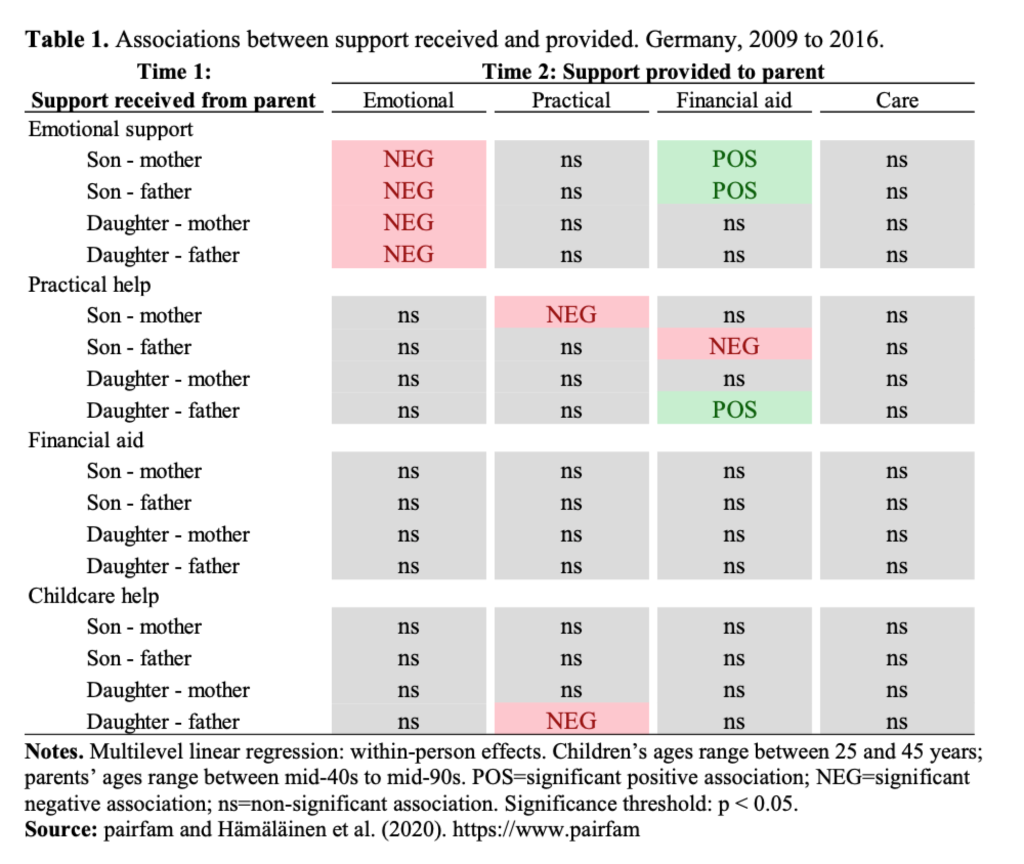Hans Hämäläinen and Bruno Arpino investigate short-term reciprocity of intergenerational support from the viewpoint of adult children. They consider multiple forms of support and examine whether previously received support from parents is associated with support provided to parents later. In Germany at least this does not seem to be the case in the years 2009-2016: help and support within families are apparently not exchanged on a quid pro quo (or reciprocity) basis.
Intergenerational support is a major theme in family science. One of the most interesting topics is whether the exchange of support between generations within a family is based on reciprocity. Although the question has been long debated in theory, empirical analyses using panel data are rather scarce. Hence, a question that has been largely unanswered is whether parents’ investments in their children pay off later: do parents who give more also receive more from the children, at some later stage? To answer this question, in a recent study we utilized panel data from the German Family Panel (pairfam) and examined whether support previously received from parents was associated with support provided to parents in later years (Hämäläinen et al. 2020)
Concept of reciprocity
Timing of actions is the core of reciprocity: individuals who receive help at a given point in time are assumed to reciprocate this help later – although the time frame may vary from short- to a very long-term (e.g., Silverstein et al. 2002). In addition to the possible time lag, reciprocity may involve different forms of support. For instance, support among family members typically takes multiple forms, such as financial aid, personal care, practical help and emotional support. It has also been shown that within families, financial aid flows mostly downwards (from the old to the young generations) while instrumental support, such as help with household tasks, flows more often upwards (e.g., Hämäläinen & Tanskanen, 2019). Hence, members may exchange one form of support for another rather than making a same-for-same exchange. For instance, adult children may repay financial aid from parents by providing instrumental support.
Does supporting a child increase the help parents receive later?
In our study (Hämäläinen et al. 2020), we examined reciprocity of intergenerational support from the viewpoint of adult children using panel data from Germany collected about every two years between 2009 and 2016. During the data collection respondents were 25–45 years old and their parents were around 60 on average, ranging from mid-40s to mid-90s. The investigation considered all the forms of exchanges between parents and children listed above, namely emotional support, practical help, financial aid and personal care. The frequency of support was measured by asking respondents to report how often they had received each form of help during the year preceding the interview (never, seldom, sometimes, often, very often).
As intergenerational relations and support patterns differ according to the sex of parents and children (e.g., Tanskanen & Danielsbcaka, 2019), we explored reciprocity separately in different sex constellations of parent-child relations:
- mother–daughter
- mother–son
- father–daughter
- father–son
The study utilized multilevel linear regression models and investigated within-person effects, that is, it focused on individuals’ variation over time and explored whether a change in the frequency of support received from a parent was associated with subsequent provision of support to that same parent. If reciprocity were an influencing factor in intergenerational support, an increase in the frequency of support received should be positively associated with the frequency of support provided subsequently.
The study analysed associations between all the above-mentioned forms of support within every parent-child dyad. Table 1 presents a summary of our results. We estimated 64 models, but we detected only three cases of a positive association indicating reciprocal exchange of support: sons who reported an increase in the frequency of emotional support from at least one of their parents more often provided financial transfers to that parent later, and daughters who reported an increase in the frequency of practical help from their father more often provided financial support to him later. We also found seven significant negative associations where an increase in the frequency of help received led to support less frequently offered later. However, the magnitude of all of the statistically significant associations is very small, and their substantive significance is limited, especially considering the relatively large number of regressions (64) that we examined.

No strong evidence for intergenerational reciprocity
Overall, our study did not disclose any notable evidence for a short-term reciprocity of intergenerational support between adult children (aged 25 to 45 years) and their parents: an increase in support received from parents did not systematically translate into more frequent support offered to parents later. Therefore, our results suggest that investing in children does not “pay off” in the relatively short period of time considered in the study. However, this does not necessarily mean that reciprocity is absent in the longer run. For instance, help received from parents may be reciprocated by adult children at some later stages of their lives, when parents get older and more “needy”.
Families differ also with regard to their level and intensity of intergenerational support and a lack of reciprocity as such does not mean that support is lacking. For instance, families with a high quality of intergenerational relationships and strong commitment to intergenerational help may have a solid support network even in the absence of genuine reciprocity effects, that is, of a causal impact of previously received help on help provided in the future. Although the net flow of intergenerational support goes from older to younger family generations, intergenerational relationships usually include downward and upward flows of support (e.g., Hämäläinen & Tanskanen, 2019). Intergenerational support may not be based on reciprocity, but adult children can nevertheless be an important source of at least potential help for their ageing parents and therefore contribute significantly to their well-being.
References
Hämäläinen, H. & Tanskanen, A.O. (2019). ‘Sandwich generation’: Generational transfers towards adult children and elderly parents. Journal of Family Studies, doi: 10.1080/13229400.2019.1586562
Hämäläinen, H., Tanskanen, A. O., Danielsbacka, M. & Arpino, B. (2020). Short-term reciprocity between adult children and parents: A within-person investigation of longitudinal data. Advances in Life Course Research, 44, doi: 10.1016/j.alcr.2020.100337
Silverstein, M., Conroy, S. J., Wang, H., Giarrusso, R. & Bengtson, V. L. (2002). Reciprocity in parent-child relations over the adult life course. Journal of Gerontology, 57B, 3–13.
Tanskanen, A. O. & Danielsbacka, M. (2019). Intergenerational Family Relations. An Evolutionary Social Science Approach. London & New York: Routledge.


